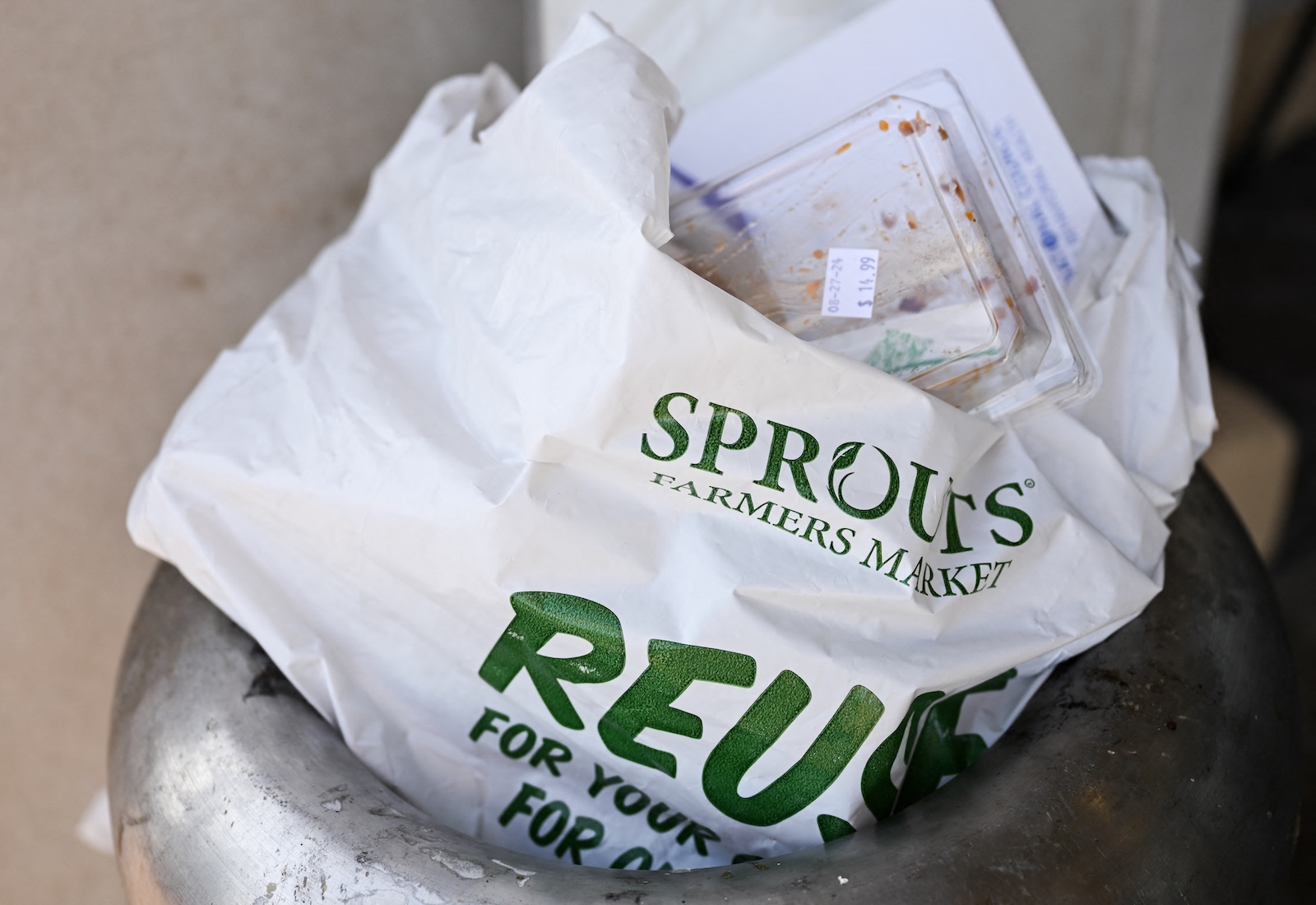Ten years ago, California became the first U.S. state to ban plastic bags. But over the next few years, the state’s landfills actually saw an increase in plastic waste. That’s because a loophole in the state’s bag ban allowed stores to continue offering plastic bags at checkout, so long as the bags cost a few cents, were labeled as reusable, and were made of thicker plastic. This thicker plastic, of course, meant that each new bag created more waste than its pre-ban counterpart when it found its way to a landfill.
The idea behind the original law was to encourage people to eschew single-use bags and instead bring their own reusable ones to the store. What policymakers appear not to have realized is that it would take more than a 10-cent fee to change people’s behavior.
California finally closed its loophole last month. The legislature updated the original law to ban all non-paper bags from being distributed at store checkout stands.
“Instead of being asked, ‘Do you want paper or plastic?’ at checkout, consumers will simply be asked if they want a paper bag, if they haven’t brought a reusable bag,” Democratic state Senator Catherine Blakespear said in a statement. “This straightforward approach is easy to follow and will help dramatically reduce plastic bag pollution.”
Across the country, however, California’s pioneering efforts may have already spread not just copycat bag bans but also the loophole that undermines them. There are at least five other states — and potentially many more cities and counties — that have written the same exceptions into their regulations. Now that California’s error is becoming better known, efforts are underway to amend at least two other states’ existing bag bans. In states that are only now looking to introduce their first plastic bag bans, legislators are taking care not to replicate the mistakes of their predecessors.
“You need a full ban on this stuff completely,” said Jack Egan, vice chair for the Connecticut chapter of the ocean conservation nonprofit Surfrider. “Otherwise, you’ve got a compromised, hamstrung, hard-to-enforce, easily worked-around ordinance.”
As with California’s original law, each of the five states whose bag bans still allow thicker plastic bags — Connecticut, Maine, Oregon, Rhode Island, and Washington — defines a “reusable” plastic bag to include those that exceed a certain thickness: typically 4 mils, though Washington’s law started at 2.25 mils — the standard set by California — and is supposed to ratchet up to 4 in 2026. (One mil is equal to 0.0254 millimeters, comparable to the thickness of a dollar bill.)
The origins of this thickness standard appear to be unknown. Some environmental groups told Grist that, when California lawmakers were dreaming up the state’s original bag ban, they were trying not to legislate away sturdy, reusable bags that happened to be made of plastic, like the ones available in Trader Joe’s checkout lines. But those bags are usually around 20 mils — 5 to 10 times thicker than those allowed by plastic bag ban laws. Other environmental advocates suggested it was pressure from the plastics industry that prevented a more straightforward ban on all bags made of plastic “film” — that is, polyethylene that is thin and stretchy — which would have included thicker versions. The American Recyclable Plastic Bag Alliance, a trade group, told the Hartford Courant in 2019 that “you can ban this product … but the alternative is worse, both economically and environmentally.”
Patrick T. Fallon / AFP via Getty Images
Melissa Gates, formerly the Northeast regional manager for Surfrider and now a director at Organizing for Impact, said Connecticut’s law was influenced by California’s, as well as by local ordinances from around the country. The version of the statewide ban that was backed by Surfrider included an exemption for thick plastic bags as a sort of “compromise” to win support from big food and retail industry associations. It worked.
“It allowed for thicker plastic bags but only with a mandatory fee,” Gates said. The idea was to get rid of the most environmentally problematic bags — the really thin ones that are most likely to quickly end up trashed, clogged in recycling machines, or ensnared in tree branches — and then discourage people from buying the thicker ones by charging 10 cents a pop. A last-minute change by Democratic Governor Ned Lamont, however, removed the mandatory fee for thicker plastic bags, a move that Surfrider lamented at the time, given that it took away the disincentive for consumers to reuse bags.
Even if the fee had stayed mandatory, however, it’s questionable whether it would have been high enough to get consumers to treat the thick bags any differently than they would treat a free, thinner bag. For many people, 8 cents is a negligible addition to their grocery bill, and not enough to prevent them from reusing thick bags just once or twice (if at all) — say, to line their trash cans or clean up after their dogs. Then, when they return to the grocery store, they have to buy new bags, incentivizing the bags’ continued production.
“As an environmentalist and a social justice advocate, I would prefer that we immediately stop making unnecessary things out of plastic,” Gates said.
Environmental advocates Grist spoke with said there’s no active campaign to amend the Connecticut bag ban, potentially because of fatigue over the decades-long back-and-forth that preceded the passage of the state’s 2019 law. Rhode Island seems to be in a similar situation: When the state finally implemented a bag ban this year, more than a decade after the idea was first introduced in the legislature, lawmakers were “so tired of talking about plastic bags,” Gates said.
But things are looking up in Oregon, where State Senator Janeen Sollman, a Democrat, is planning to introduce a bill next year that would expand the statewide bag ban to cover disposable plastic bags of any thickness. Sollman told Grist she’s long known about the problems with California’s first bag ban, and that she tried to get around them with Oregon’s first bag ban, enacted in 2019. The law upped the required thickness of a reusable bag from 2.25 mils to 4 mils to encourage reuse — but it didn’t work.
The plastics industry “just went around that, made a thicker bag, and then called it reusable,” Sollman said, even though that type of bag was ultimately “just ending up as another piece of garbage.”
Sollman said her forthcoming bill will mirror the new California law, which redefines “carryout bag” to include any bag — other than a recycled paper bag — provided to customers at checkout. The bill is also expected to propose a phaseout of single-use plastic toiletries, like the kind offered in hotel rooms, along with some other measures to reduce plastic pollution.
AP Photo / Gilian Flaccus
Meanwhile, other states are experimenting with different language to close the thick-bag loophole — or prevent it from opening in the first place. New York state’s plastic bag ban says a reusable bag must be made from “cloth or machine washable fabric” or “other non-film plastic washable material.” (Key word: “non-film.”) Colorado, Delaware, New Jersey, and Vermont say a bag is reusable only if it has “stitched handles.”
In Massachusetts, which does not yet have a statewide bag ban, Surfrider helped draft a bill that used a combination of several other states’ strategies, requiring a reusable bag to have stitched handles while also clarifying that it “shall not include a bag made of plastic film of any thickness.” Senator Jamie Eldridge, a Democrat who’s been working on a statewide bag ban for the past decade, told Grist that that language was introduced after the plastics industry floated the idea of allowing thicker plastic bags.
“At one point that was one of their pitches,” he said. “So we looked into it” — and rejected it, after seeing the consequences in other states and municipalities. “That’s why we strengthened the bill,” he added. This year’s version of the legislation passed the senate but isn’t expected to be voted on in the state’s house of representatives; Eldridge said he plans to reintroduce it during the next session.
Erin Hass, director of the American Recyclable Plastic Bag Alliance, a trade group, said it didn’t lobby for the Massachusetts bill, but that it supports the use of thicker plastic bags. “The reality exists that consumers could take their film bags back to stores, which could then be routed into the existing circular film recycling infrastructure,” she told Grist.
Previous investigations from ABC News and Bloomberg have suggested that most of the plastic bags deposited in store drop-off receptacles aren’t recycled. More often, they end up in landfills or incinerators.
Read Next
The two other bag ban states with thickness loopholes, Maine and Washington, don’t have pending bills to change their legislation. But that could be changing: Isabella DeFrancesco, Surfrider’s Northeast regional manager, said her organization’s Maine chapter is making it a “priority campaign” to get rid of that state’s thicker-bag allowance next year. And in Washington state, the Department of Commerce is supposed to submit a report to the legislature evaluating the efficacy of its existing bag law by the end of this year, giving lawmakers an opportunity to amend the thickness provision.
Heather Trim, executive director of the nonprofit Zero Waste Washington, said the legislature may be tied up by other plastic-related bills during the next session, but her organization plans to prioritize an updated bag ban in 2026, using language similar to California’s new law.
“I think California has nailed it,” she said.
Gates, the former Surfrider manager, said she hopes a series of refreshed laws will reflect what has always been bag ban advocates’ intent: to eliminate single-use bags — whether paper or plastic — where they’re not needed, and to get people to bring their reusable bags to the grocery store.
“The ultimate goal,” she said, is “shifting the consumer paradigm away from this wasteful tendency to view things as single-use, and prioritize convenience over almost everything else.”
This story was originally published by Grist with the headline California inspired a wave of plastic bag bans — with an unfortunate loophole on Oct 11, 2024.
The Golden State finally fixed its ban last month, but at least five other states still allow the distribution of extra-thick “reusable” plastic bags. Regulation Grist








